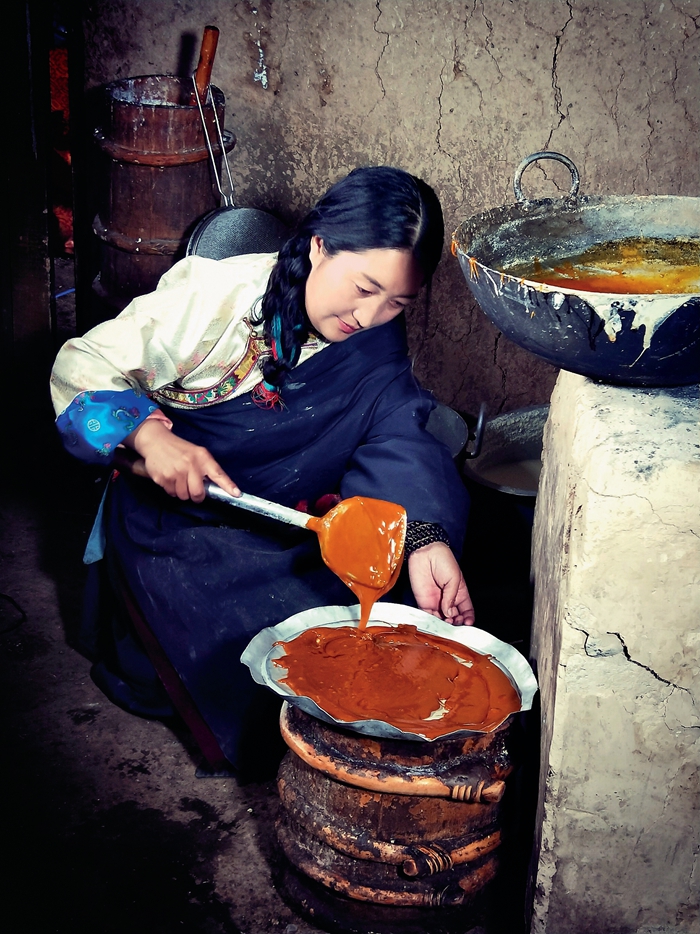Tibetan herdswoman inherits wisdom of folk culture through handmade candies


Baike cooks yak's milk into Quke'anda, a traditional Tibetan candy.[Photo provided to Women of China]
Quke'anda is a traditional Tibetan candy. The word, "quke'anda," means "sweet-smelling cream." Baimakangzhu, better known by her name, Baika, is a herdswoman in Haxiu town, in Yushu, a city in Yushu Tibetan autonomous prefecture, in northwest China's Qinghai province. Baika, who was born in 1988, has helped make Quke'anda popular in other regions of China. She has also helped women in her hometown earn a better living by making the traditional candy. Baika says she hopes Tibetan candy will one day be better known and favored by people worldwide.
Baika and her two younger sisters lived with their grandmother while they were growing up. Baika has memories of her childhood, especially of her grandmother cooking yak's milk into the traditional candy, Quke'anda. Baika, who thought her grandmother possessed "magic," says, "Students and teachers from a local school in my hometown used to visit my home, and they asked for grandma's handmade candies. They put the small candies in their hands and they licked a bit each time. They said the sweet taste 'touched' the bottom of their hearts, and the taste reminded them of our beloved pasturing areas, in Haxiu town."
Over time, Baika began to ask herself why she shouldn't produce the handmade Quke'anda and promote the traditional sweet, from Yushu, throughout China. She decided it was worth a try, and in 2015 she registered a company, Youth Herdswoman Trade and Business Limited. She opened a plant in Walong, a village in Haxiu town, where she produced and studied all things Quke'anda. Baika invited seven doctors, who had studied Tibetan medicine, to help adjust the taste of the traditional sweet cooked from yak's milk. She hoped the Quke'anda produced by her company could have a sweet-and-sour flavor, which she believed would be more suitable for people in other regions of China to eat. She employed 15 herdswomen, from Haxiu, as regular workers, and that helped those women earn stable incomes.
In 2017, Baika attended two workshops, one hosted by Mulan Academy and the other hosted by the Academy of Arts and Design of Tsinghua University (AADTHU). During the AADTHU workshop, Baika took part in an exhibition that highlighted China's intangible cultural heritage. She took Quke'anda for her teachers and peers to eat. They praised the unique taste of the traditional Tibetan candy, and they gave Baika advice both on how to improve her packaging and how to expand the market.
At Mulan Academy, Baika shared her understanding about life in the pasturing areas of Yushu. She said: "We respect and cherish nature. Yaks are our good companions. They give us food and play an important role in our lives. Quke'anda, the seemingly small candy, represents a kind of wisdom passed from our ancestors. Quke'anda is also the best gift I have obtained from my grandmother. In Yushu, I cook Quke'anda with my fellow sisters, and this small candy makes us feel closer to nature. I hope to combine Quke'anda with the wisdom of our folk culture, and to share that wisdom with more and more people."
In fact, Baika has helped a dozen women, from impoverished families in Haxiu, to earn a better living by making Quke'anda. Now, Baika has a bigger dream: To bring Quke'anda to the world.
"I hope people will think of the culture of Tibetan people when they taste this small candy. Quke'anda can be something, like the Tibetan language or Tibetan clothing. Once people see it, they will think of the beauty of our traditional culture. My dream, as a Chinese, is to help women in my hometown become more confident, and proud, when they cook this sweet that originated in our hometown," Baika concludes.




